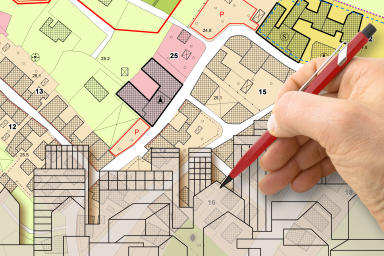How To Handle a Property Dispute With a Neighbor

Disputes over real estate are common in the United States. Murky boundary lines can affect relationships between neighbors, companies, and governmental agencies, eventually leading to contentious legal battles. If you find yourself in an argument with a neighbor over a property issue, stay civil and check your community’s laws. Many times, disagreements can be resolved neighbor-to-neighbor with some good old-fashioned communication without escalating the dispute to court. If you need to know the best way to handle a property dispute with a neighbor, these general guidelines can help you evaluate your options and move toward resolution.
Common Property Disputes
Property disputes are legal disputes that involve real estate property, including single-family homes, apartments, roads, condominiums, and natural features. These disputes can involve a wide range of parties, which may include:
Neighbors
Homeowner’s Association
Landlords and tenants
Family members
Government agencies
Property visitors
Trespassers
Often, property disputes result in the plaintiff receiving compensation to cover their losses. In general, if you own land, it is a good idea to be vigilant and ensure others are not using it illegally or trying to claim it as their own. Below is a list of common property disputes that you should be aware of before any major projects on your land:
Boundary Issues
One of the most common disagreements is between neighbors regarding where property lines are drawn. This type of dispute arises when neighbors have different understandings of the location of the property line. These issues are more difficult to solve after the structure is already in place. Moving a fence is not easy, so legal intervention may be the only way to settle the property dispute if negotiations do not move forward. Zoning issues and ownership disputes can also result in complex legal battles.
Breach of Contract
Real estate contracts are binding agreements that are meant to protect both buyers and sellers through the process. Sellers are bound by law to ensure that all known details and defects are disclosed to the buyer. Additionally, both parties must ensure they abide by all of the terms and conditions set forth in the contract. If one party does not comply with the terms of the contract, the other party may have a claim for breach of contract. A seller who fails to disclose a property issue is also legally liable under breach of contract.
Co-Ownership
Purchasing a property with another party can be a smart investment decision but ownership disputes about who is the rightful owner of a property can quickly escalate. There may be a number of reasons why a joint owner disagrees with the other. Disputes over property improvements, maintenance costs, and who pays the taxes and mortgage are all common property issues that wind up in court.
How To Handle a Property Dispute With a Neighbor
The legal process for property disputes can be arduous if both parties are unwilling to work together. Dispute litigation can cost a fortune and take a long time. Most lawyers recommend attempting to resolve the issue directly with your neighbor. If settlement is out of the question, you may need to hire an attorney to proceed. When it comes to property disputes, you should work with an experienced property dispute lawyer.
1. Understand Property Issue
The most important step in a property dispute is understanding what the boundary issue is in the first place. Once both parties agree on the boundary issue, you can work together to resolve it without escalating the claim. Try to find a solution with your neighboring property owner to avoid the high cost of attorney’s fees. If you cannot come to an agreement or there is an outstanding disagreement on the boundary issue, then it may be time to hire a property lawyer who can mediate between both parties.
2. Send Demand Letter
If both parties cannot reach an agreement, the next step is to send a demand letter. Hire an attorney to draft the letter and explain your legal grounds. The letter will outline the property dispute and give your neighbor the option to respond via a requested action, or it will provide a reasonable price for settling out of court.
Go to Court or Settle
The best option for both parties is to settle the dispute out of court to avoid costly legal fees. However, if negotiations are not moving forward, it may be necessary to file the dispute with the court. This is the time to hire legal representation to fight on your behalf. Review local regulations to determine where you should file your claim. In some states, boundary and property disputes are the purviews of local county circuit courts but double-check your local jurisdiction to ensure your paperwork is filed with the correct office.
The court will then examine the evidence closely and make a legally-binding decision that both parties must follow. To get the result you want, it is usually best to settle with the other party or hire a knowledgeable attorney who can advocate for your desired outcome and settlement.
Frequently Asked Questions
Whether you’re filing a property dispute against your neighbor or defending a dispute, you will need an attorney that understands local property laws. Search Expertise.com’s real estate attorney directory and concierge program to find local experts who can help you navigate the property dispute process
Who pays for the survey in property disputes?
In general, the person who requests the land survey pays for it. However, in certain states like Oregon, Indiana, and New Jersey, it is the buyer who takes on the cost of a land survey. Boundary surveys can cost anywhere between a few hundred to over a thousand dollars, depending on various factors. If you’re going through a property dispute, you will need to pay for the boundary survey on your own to resolve the legal issue.
Is there a statute of limitation on property line disputes?
Yes, property line disputes are subject to a statute of limitations depending on where you live. The statute of limitations varies by jurisdiction and state, so it is necessary to consult with a legal representative as soon as possible to ensure the statute of limitations does not expire.
Does my title insurance cover property line disputes?
Title insurance is an insurance policy that comes with the purchase of a home to prevent loss of equity or interest should title disputes arise. For the lender, their financial interests are the primary concern, and they don’t want to risk financial loss should there be a disagreement. It is no wonder many homeowners believe title insurance will protect them during a property dispute.
Despite a prevalent belief to the contrary, the title insurance policy that many buyers purchase during escrow does not cover property line disputes. Buyers must ensure a licensed professional completes an up-to-date land survey before closing on their new home.
Do I need a lawyer for a property dispute with my neighbor?
If negotiation attempts have gone unresolved, it is time to hire a lawyer. An attorney knowledgeable in property law can ensure you receive fair and adequate compensation while complying with local regulations.
Expertise.com StaffAuthor
Step into the world of Expertise.com, your go-to hub for credible insights. We don't take accuracy lightly around here. Our squad of expert reviewers, each a maestro in their field, has given the green light to every single article you'll find. From rigorous fact-checking to meticulous evaluations of service providers, we've got it all covered. So feel free to dive in and explore. The information you'll uncover has been stamped with the seal of approval by our top-notch experts.


![Much Does a Real Estate Attorney Cost? [2023]](https://images.ctfassets.net/k00sbju4hbzq/jeHWDk6nRgicyElptqWc9/474a20dc2dd2f4a8ddcd39a477001e61/Depositphotos_162710700_XL.jpg?fit=fill&w=384&q=75)

